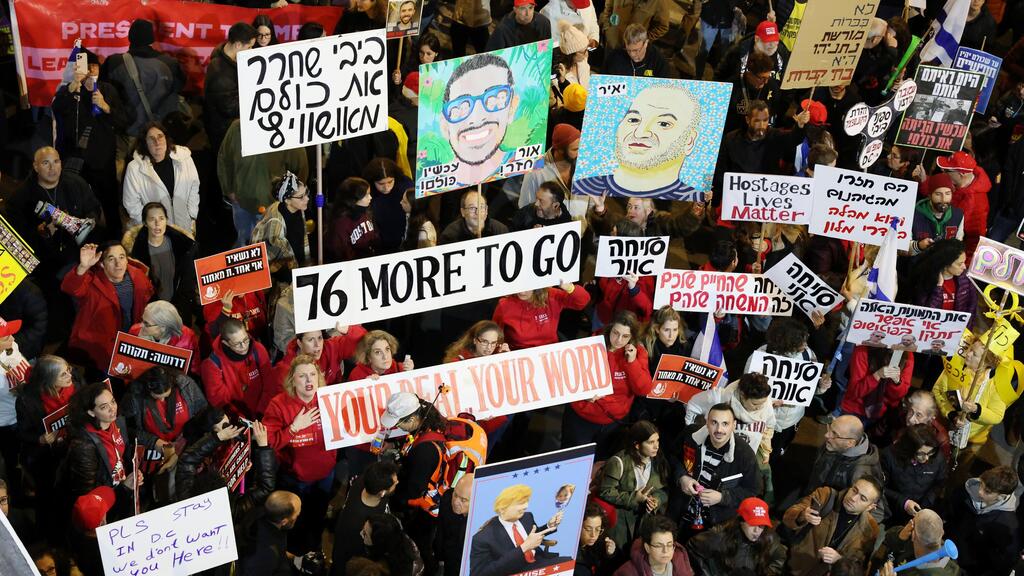A senior Palestinian official in one of the Gaza terrorist organizations told the Al-Mayadeen channel, affiliated with the Shiite axis and Hezbollah, on Monday afternoon that "Hamas believes that Israel is planning to scuttle the cease-fire agreement." According to the official, Hamas believes that Israel is relying on the United States and U.S. President Donald Trump and, according to him, the statements coming from Israel regarding the second phase of the agreement indicate its intention not to reach a permanent cease-fire and complete the withdrawal from the Gaza Strip.
Meanwhile, the Israeli negotiating delegation that went to Qatar for discussions on the first phase of the agreement has returned to Israel. On Tuesday, the political-security cabinet will convene to discuss the second phase, and in the discussion Prime Minister Benjamin Netanyahu is expected to approve the Israeli conditions for progressing to Phase II: the expulsion of the Hamas leadership from Gaza; the disarmament of the terrorist organization's military wing; and the release of all the hostages. All of these, if accepted, are supposed to bring an end to the war on Israel's part but, according to estimates, Hamas is expected to refuse this.
3 View gallery


Hamas terrorists during the fifth round of the hostage release
(Photo: Eyad Baba / AFP)
The Israeli delegation that traveled to Doha dealt with phase one issues only, and continued its talks and the implementation of the first phase's steps, with the aim of ensuring that there would be no further violations. Netanyahu reached agreements on the principles of the second phase with U.S. President Donald Trump and his envoy Steve Witkoff - however, Hamas is not expected to accept them - and therefore an effort will be made by the Israeli side to extend the first phase as much as possible to allow for the release of additional hostages and an extension of the cease-fire.
The Arabic-language Sky News network quoted Musa Abu Marzouk, a senior Hamas official, as saying at noon that "the negotiations on the second phase of the agreement have not begun, Netanyahu missed the deadline due to his visit to the United States. We expect the negotiations to continue and take their natural course."
Phase II of the deal, which includes ending the war, effectively marks the beginning of "the day after" in the Gaza Strip - and therefore the list of demands that Hamas has presented in the past regarding it has repeatedly crossed all of Israel's red lines. The terrorist organization's main demand, in order to agree to the release of the 65 Israeli and foreign hostages who are not included in the first phase and are considered a final bargaining chip for it, is to end the war. This is a complete end, a "sustainable peace" without reservations, within the framework of which Israel will fully withdraw from the Gaza Strip and allow billions of dollars from other countries to be poured in for its reconstruction.
If Hamas does not agree to an extension of Phase I and if it ends with the return of the 33 hostages, Israel may face the question of whether to return to fighting while 65 hostages, some still alive, remain in Hamas captivity, in harsh conditions and while being tortured, according to testimonies published last night from the hostages who returned on Saturday.
An Israeli move to Phase II while accepting Hamas' demands may put Netanyahu in a political limbo, as Finance Minister Bezalel Smotrich and his Religious Zionist party have already announced that at the end of the first phase they will demand a return to fighting and the destruction of Hamas.
3 View gallery


The hostages released on Saturday - the remaining hostages are believed to be in even worse shape
(Photo: Abdel Kareem Hana/AP)
On Sunday night, Smotrich said that the terrorist organization's demands, including its remaining in power, will set a dangerous precedent for the future. "What will be the next stage? The terrorist organizations are kidnapping more Israelis and demanding an Israeli withdrawal from Judea and Samaria, evacuation of settlements, and the establishment of a Palestinian state in exchange for their release? This is a red line that must not be crossed," Smotrich said. "There will be those who will say that we have already crossed this line at the current stage of the deal by agreeing to withdraw from the Netzarim Corridor and allow the return of Gazans to the northern Gaza Strip. This is true, and this is one of the reasons we opposed the deal. But this is a temporary and reversible step, it must not be turned into a slippery and dangerous slope."
Smotrich concluded his remarks by saying, "This bright red line must not be crossed. We will not be forced to take political steps as part of a deal to release hostages. There is no responsible leader who would make policy decisions and submit to political dictates as part of a hostage deal. Anyone who would do this does not deserve to be a leader. Our government will not succumb to this madness."


